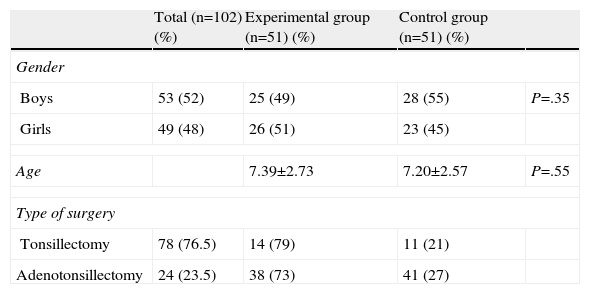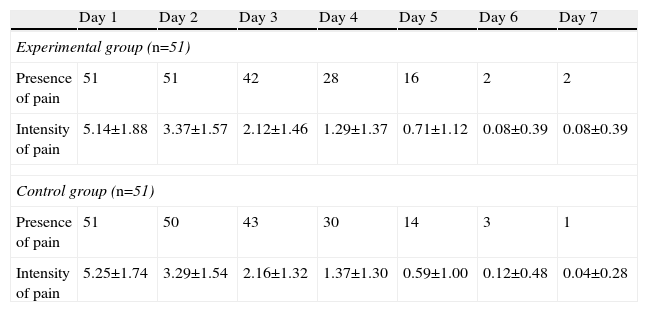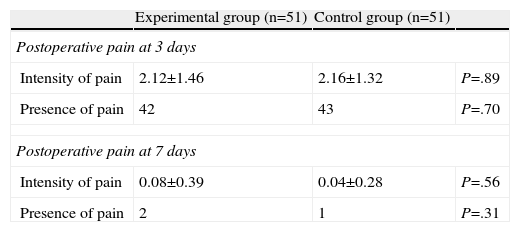Postoperative pain is the main symptom and the most incapacitating one in tonsillectomy, and prescribing oral antibiotics to reduce postoperative pain is common. The objective of this study was to evaluate the efficacy of 2 different prophylactic antibiotic schemes to reduce postoperative morbidity in paediatric patients undergoing tonsillectomy. One scheme consisted of a single-dose preoperative cephalothin, while the second was an oral antibiotic.
MethodsThis was an open randomised trial on patients aged 4–15 years undergoing tonsillectomy. The experimental group received single-dose intravenous cephalothin, while the control group received single-dose intravenous cephalothin+oral suspension of amoxicillin/clavulanate for 7 days. We compared the presence and intensity of pain, limitations to normal diet, habitual activities, halitosis, otalgia and nausea within 7 days after surgery using the Wong-Baker FACES Pain Scale and a questionnaire for the parents.
ResultsFor the 102 patients that underwent tonsillectomy (51 per group), there was no difference in the presence and severity of postoperative pain between the 2 groups (P>.05). Neither was there any difference in the days needed to return to normal activities, normal diet, and duration of days with halitosis, otalgia or nausea. Just 1 patient from the control group had postoperative bleeding. There were no infectious complications.
ConclusionsThe use of single-dose preoperative intravenous cephalothin has the same efficacy as the use of oral amoxicillin/clavulanate for 7 days in reducing morbidity in paediatric patients undergoing tonsillectomy and offers safe antimicrobial prophylaxis. Consequently, the routine use of oral antibiotics should be avoided.
El dolor postoperatorio en amigdalectomía es el síntoma principal y el más incapacitante, la prescripción de antibióticos es una práctica común para disminuir el dolor postoperatorio. El objetivo del estudio fue comparar la eficacia del control de la morbilidad postoperatoria de un esquema de profilaxis antibiótica intravenoso dosis única preoperatorio contra un antibiótico vía oral postoperatorio en pacientes pediátricos sometidos a amigdalectomía.
MétodosEnsayo clínico controlado aleatorizado abierto, pacientes de 4-15 años sometidos a amigdalectomía. Grupo experimental: cefalotina IV dosis única; grupo control: cefalotina IV dosis única + amoxicilina/clavulanato durante 7 días. Se comparó la presencia e intensidad del dolor, tolerancia a vía oral, limitación de actividades, halitosis, otalgia y náuseas en los primeros 7 días de postoperatorio mediante la Escala Visual Análoga del Dolor de Wong-Baker y un cuestionario contestado por los padres.
Resultados102 pacientes sometidos a amigdalectomía, 51 por grupo. No hubo diferencia en la presencia ni intensidad del dolor postoperatorio entre ambos grupos (p>0,05). No se encontró diferencia en los días para la reincorporación a las actividades habituales, dieta normal, días con halitosis, otalgia o náuseas. Se presentó solo un caso de sangrado postoperatorio en el grupo control. No ocurrieron complicaciones infecciosas.
ConclusionesEl uso de cefalotina IV dosis única en el preoperatorio tiene la misma eficacia que el uso de amoxicilina/clavulanato vía oral durante 7 días para el control de la morbilidad en pacientes pediátricos operados de amigdalectomía y ofrece una profilaxis antimicrobiana segura, por lo que el uso rutinario de antibióticos vía oral debe ser evitado.










